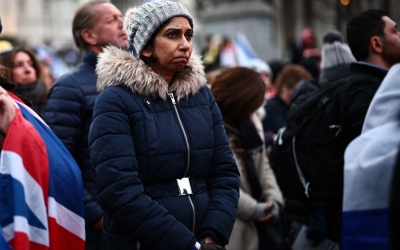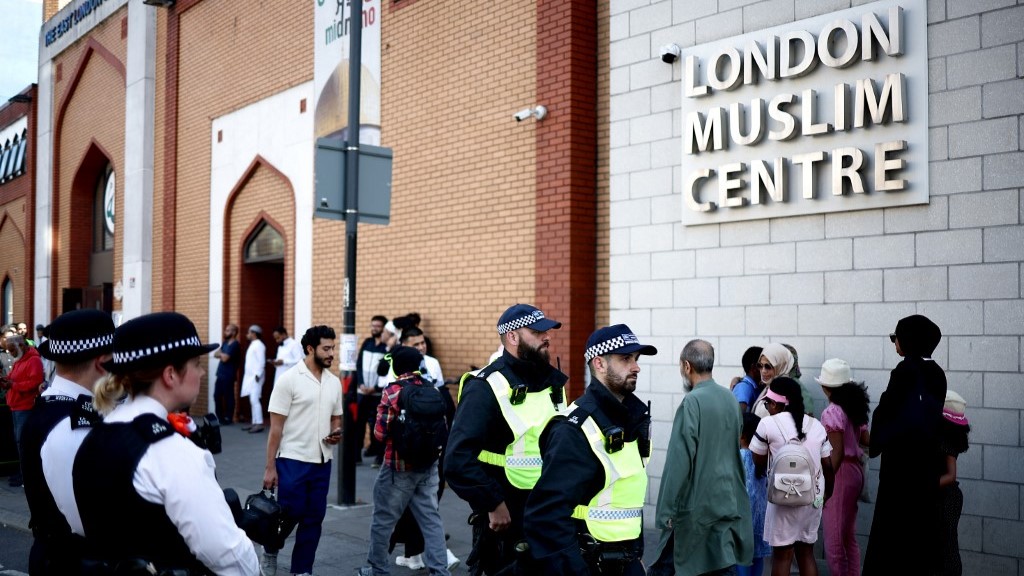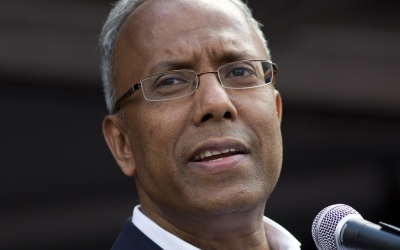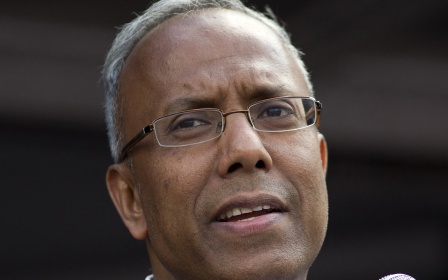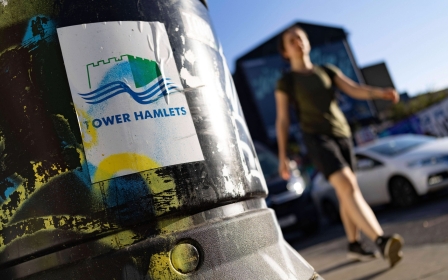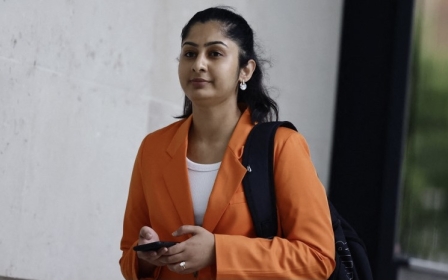Exclusive: Michael Gove secretly looked for extremism in Tower Hamlets audit but found none
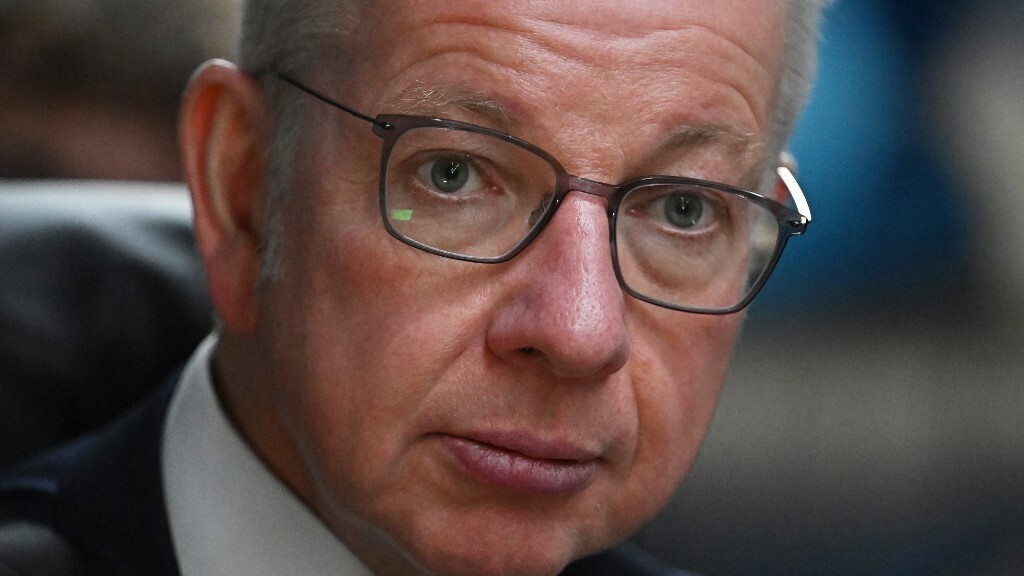
Former Communities Secretary Michael Gove appointed former British ambassador to Saudi Arabia Sir John Jenkins to inspect Tower Hamlets council due to secret concerns about "extremism", Middle East Eye can reveal.
MEE can further disclose that Gove used the highly controversial 2015 investigation into the Muslim Brotherhood led by Jenkins as a basis for identifying the risk of "extremism".
In February, Gove, who is now editor of the Spectator magazine, ordered the audit of the council but never disclosed that extremism was one of the reasons for the inspection.
The audit was released on Tuesday, but did not find any evidence of extremism in the council, and did not mention an attempt to find any.
The government will nevertheless appoint ministerial envoys to monitor Tower Hamlets council's management after the report found a lack of scrutiny, a "suspicious and defensive" administration and concerns over a "culture of patronage".
New MEE newsletter: Jerusalem Dispatch
Sign up to get the latest insights and analysis on Israel-Palestine, alongside Turkey Unpacked and other MEE newsletters
In February, Gove officially instructed the inspection team to report on "whether the standards expected for effective and convenient local government are being upheld".
Issues included how money is spent and senior job appointments.
But community organisers, academics and local politicians expressed their bemusement that Jenkins, a career diplomat with no apparent expertise in local government, was part of the inspection team.
In March they sent a letter to Gove alleging that Jenkins had endorsed Islamophobic social media posts.
The letter said the "long list of diplomatic roles assigned to him raises many concerns as to why a former Middle East diplomat would be assigned specifically as an inspector of this borough, which is one of the most diverse boroughs in the country".
The reason has now emerged.
'Specialist knowledge'
A letter dated 23 September, seen by MEE, reveals that Jenkins was appointed because of his "specialist knowledge of extremism".
This bombshell letter was sent by government lawyers responding to a pre-action letter sent by the council's legal representatives.
It reads: "The then Secretary of State [Michael Gove] was concerned about evidence of the existence of extremism within LBTH [London Borough of Tower Hamlets] and the effect that may have on its ability to deliver best value in the areas within which he ordered it to be inspected."
MEE understands that Tower Hamlets' mayor, Lutfur Rahman, alleged in a letter to Jim McMahon, minister for local government, before the report's publication that the previous Conservative government had covertly used the audit as a "fishing expedition to search for extremism within the Council".
'To date, we have not been presented with any evidence about any links between the council and extremism'
- Tower Hamlets mayor, Lutfur Rahman
"We were not informed at any point, formally or informally by government or inspectors, that the council was under investigation for extremism," he said.
"To date, we have not been presented with any evidence about any links between the Council and extremism."
Gove's order to investigate coincided with political furore over Palestinian flags and pro-Palestinian murals in Tower Hamlets.
In January this year, pressure group UK Lawyers for Israel (UKLFI) sent a letter to the London Metropolitan Police, claiming that the flags and other signs of Palestinian support in the borough were offensive.
Then, in late February, the former Tory minister for London, Paul Scully, stoked controversy around Tower Hamlets by claiming it and other neighbourhoods were "no-go zones" because of their large Muslim populations. He apologised for his comments the next day amid widespread criticism.
In March, it was reported that the council would take the flags down on residential roads, for which it has responsibility. This came after UKLFI warned it would take legal action against the council.
The government audit released on Tuesday said: "Some residents have wished to demonstrate their views through the flying of Palestinian flags in the area. Others have found the presence and extent of these flags concerning.
"We consider that the Council has been too slow to respond to this issue."
A letter threatening legal action sent by the council's lawyers to the government, seen by MEE, accuses government inspectors of asking council officers of Bangladeshi origin where they "came from", on one occasion in an "aggressive and intimidatory manner".
The letter also mentions six members of Aspire, Rahman's political party, saying that inspectors asked them "direct questions about their opinions on Gaza, what their views were about the Palestinian flags being put up in Tower Hamlets, if they helped put them up and what their political backgrounds were".
The government's lawyers strongly denied this in their letter of response.
Controversial approach to Islamism
MEE can further reveal that the government's lawyers named former East London Mosque (ELM) chairman Dr Muhammad Abdul Bari as an example of the "risks" of extremism that Gove was concerned about within Tower Hamlets.
They highlighted the council asking Abdul Bari to join their Transformation Board in 2023 as a matter of concern.
Abdul Bari, who holds a Member of the Order of the British Empire (MBE), was made a fellow of the Royal Society of Arts in 2005 and served as secretary general of the Muslim Council of Britain (MCB) from 2006 to 2010.
He then served on the London Organising Committee of the Olympic and Paralympic Games Board (LOCOG), which staged the 2012 Olympics.
The letter points to Abdul Bari's leadership of the MCB, noting that it is "an organisation that HM Government does not engage with".
During Abdul Bari’s leadership, the MCB was briefly boycotted by Gordon Brown's Labour government in 2009. Labour restored ties with the organisation before its defeat in the 2010 general election, shortly before Abdul Bari himself stepped down.
The letter further points to Abdul Bari being a former chairman of the ELM, describing it as an "organisation of concern", without explaining why. MEE contacted ELM for comment.
It mentions that he is also a past chairman of the Islamic Forum of Europe (IFE), now called the Muslim Community Association, which is linked to the South Asian Muslim movement Jamaat-e-Islami (JI).
The lawyers' letter called JI "the South Asian equivalent of the Muslim Brotherhood".
Citing the review launched in 2014 into the Muslim Brotherhood, the letter asserts: "Aspects of Muslim Brotherhood ideology and tactics, in this country and overseas, are contrary to our values and have been contrary to our national interests and our national security".
That review, which has never been fully made public, was led by Jenkins, who was then the UK's ambassador in Riyadh.
The United Arab Emirates was reported to have played a key role in persuading then-Prime Minister David Cameron to commission the report. It did not proscribe the Brotherhood as a terrorist organisation, but suggested that the organisation had served as a "rite of passage" for "violent militants".
In the wake of its publication, Cameron said membership of the group was a "possible indicator of extremism".
However, two years later the government rowed back from the main conclusion of Jenkins' report and instead appeared to accept a strikingly different assessment offered by the parliamentary Foreign Affairs Committee (FAC).
The FAC contradicted the Jenkins report by concluding that political Islamists were a "firewall" against violent extremism and should be engaged with.
This assessment goes unmentioned in the letter by the government's lawyers, leaving Gove open to the charge that he selectively used Jenkins' highly disputed report as the basis for identifying a risk of 'extremism' in the Tower Hamlets council.
Abdul Bari told MEE: "My decades of public service, including the London Olympic Board and MBE recognition, speaks for itself.
"Because of my long work in the community and in serving special education needs in the borough, I was asked to join Tower Hamlets Transformation Board, but I declined. I left the Islamic Forum of Europe in the mid-1990s and my involvement with ELM and MCB ended over a decade ago.
"These baseless accusations of extremism reflect only the prejudices of those making them. My work has always been about building bridges between communities."
'Undue spiritual influence'
Rahman, a former Labour politician, was elected mayor of Tower Hamlets in May 2022. He previously held the position from 2010 to 2015 but was found guilty of electoral fraud in April 2015 and banned from standing for public office for six years.
Among the reasons for the ban was that he was found to have exerted "undue spiritual influence" on voters.
The concept of "undue spiritual influence" is highly contentious because it is associated with anti-Catholic legislation in the 19th century.
It dates back to the 1883 Corrupt and Illegal Practices Act, which was introduced to combat the influence of the Roman Catholic clergy on the Irish working classes.
The current treatment of the Tower Hamlets council appears to be influenced by a controversial neoconservative approach to counter-extremism.
Jenkins is now a senior fellow at the right-wing think tank Policy Exchange, which was influential in shaping the Conservative government's counter-extremism policy.
Gove drew widespread criticism when he was in government for his counter-extremism policy. In March this year, a month after ordering the Tower Hamlets audit, he unveiled a contentious new definition of extremism.
Gove named several Muslim organisations which he threatened to "hold to account" using the new definition because of their "Islamist orientation".
He was cautioned about the new definition in an open letter signed by three former home secretaries in previous Conservative governments, while Amnesty International described it as a "smash and grab on our human rights".
The council audit
The audit into Tower Hamlets, released on Tuesday, accused the council of a "weak and confused" culture of scrutiny and added that it was "suspicious and defensive in its behaviour".
McMahon, minister of state for local government, attacked the council in parliament on Tuesday: "A culture of patronage, even if not at play in every appointment, is perceived as pervasive enough to undermine trust between members, staff and leadership, as well as with external stakeholders."
The report did not detail what the "culture of patronage" specifically entailed.
It also accused the council of failing to respond to local "tensions" surrounding the war in Gaza.
The report identified "several positive features at the Council", including that it has already taken "steps to make improvements" based on previous criticisms.
Tower Hamlets has a distinctive character, with the highest proportion of Muslims in the UK, at 39 per cent according to the 2021 census, alongside some of the highest rates of poverty in the UK.
The ministry for local government declined to respond to a request for comment and pointed MEE to McMahon's statement to parliament on Tuesday.
MEE also contacted Jenkins for comment but did not receive a response by the time of publication.
Middle East Eye delivers independent and unrivalled coverage and analysis of the Middle East, North Africa and beyond. To learn more about republishing this content and the associated fees, please fill out this form. More about MEE can be found here.


